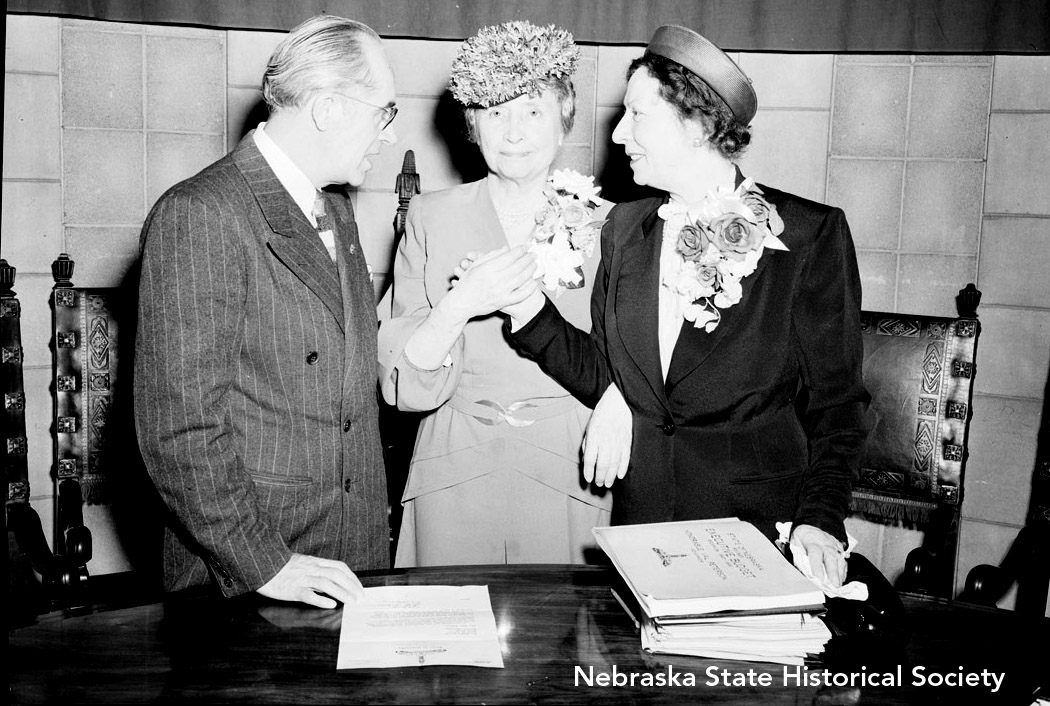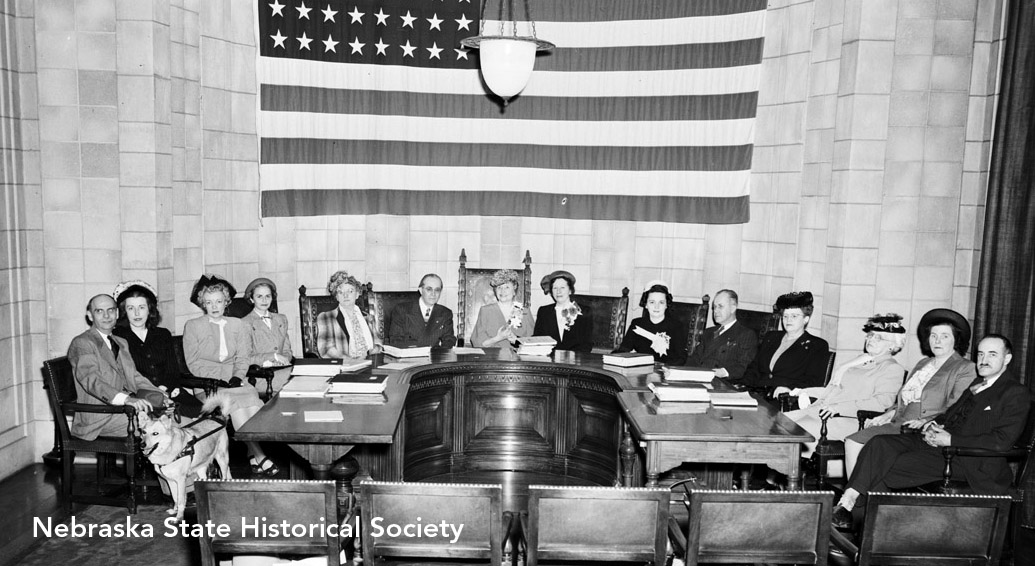
Unidentified man with Helen Keller and her secretary, Polly Thompson during her visit to Lincoln on May 12, 1947. Thompson communicated with Keller by touch. RG2183.PH001947-00512-2
It’s 1947, and the Nebraska legislature has not passed funding for educating and rehabilitating people with vision loss for twenty-five years. Who are you going to call? You call the “nationally famous deaf and blind authoress and lecturess” Helen Keller. Keller was on a national lecture tour sponsored by the American Foundation for the Blind, raising money to help blind children in war-ravaged Europe. She made a side trip to Lincoln, Nebraska, in May 1947 to advocate for funding because she was appalled by Nebraska’s lack of attention to its blind residents.
She ranked the state’s “low standards” in the bottom three in the country. “I was astonished and shocked that not only has Nebraska ranked far behind in establishing a program for the blind but even displayed at the polls a primitive and un-Christian attitude toward those who, through no fault of their own, live in the dark,” the 66-year-old Keller said at a May 12 luncheon in Lincoln (Lincoln Star, May 12, 1947). Keller was known internationally as a writer, speaker, and advocate for the blind. A childhood illness left her deaf and blind at the age of twenty months. Her journey to learn language under the care of her tutor and teacher, Anne Sullivan, was later immortalized in the play and the movie The Miracle Worker. After Keller learned sign language via touch, she blossomed as a writer and speaker even from the age of eight because of her extraordinary abilities.
Mark Twain even tallied Keller among “‘Caesar, Alexander, Napoleon, Homer, Shakespeare, and the rest of the immortals.’ Her renown, he said, would endure a thousand years” (Ozick). Nebraskans seemed similarly impressed with Keller. Lincoln papers gave the visit extensive coverage. During an interview in her hotel room the night before she spoke, Keller told the Nebraska State Journal “I’m going to tell them of the great need of the blind, of how the blind must be understood and treated as human beings. The blind must be allowed to have the same feelings, same desires and ambitions as those that see.” She then spoke in front of a sold-out public luncheon before addressing the Legislature.
At the luncheon, she spoke frankly to the gathered public. “I understand that Nebraska prides itself by not being burdened with extra taxes of a complicated legislative system,” Keller said. “Yet it continues to deny it blind adequate rehabilitation though it has been proven that the blind, given a chance, can support themselves and can take their place in life and in the work of their community. “You who are responsible citizens and trusted stewards of Nebraska’s economic advantages, I implore you to co-operate with your enlightened governor and his committee to rescue the thousands of handicapped men and women from needless misery. You will agree, I am sure, that a state is not progressive or even civilized if it does not seek to safeguard the interests of all of its people. Will you not use your influence to arouse the people of Nebraska to a sense of duty to aid the handicapped and help the blind turn disaster into a bridge-road of creative usefulness?”

Group in governor’s office with Helen Keller during her visit to Lincoln May 12, 1947. RG2183.PH001947-000512-1
All three Lincoln newspapers ran stories about her visit, but The Lincoln Star had the most coverage. “Miss Keller speaks in a slightly nervous, throaty voice,” the Star reported. “Yet, her voice and her message brought tears to the eyes of several blind persons in the audience. Seeing-eye dogs barked, as if in salute, when Miss Keller entered the luncheon hall, then remained quiet throughout her address, except during the applause. Asked what she thought of the governor’s [Governor Val Peterson] policy for the blind, Miss Keller said it impressed her as a policy ‘of true administration with a discerning eye for the needs of the blind. The most important fact in an effective program is that it is not enough to procure a program of legislation or to give money, but also to have qualified workers who themselves have faith in the blind…also a watchful eye to see that the laws, once made, do not become so much dead letter.’
The paper also included details about Keller’s personality, her speaking persona, and her views on policy. “Miss Keller told the audience that she enjoys flowers. She spoke of going to Radcliff college and her favorite subject – philosophy. Her greatest ambition is ‘to keep on working until the handicapped everywhere have a fair chance in life.’” The reporter also asked Keller why she was so happy. “Because,” she replied, “I always feel God’s nearness because I have wonderful friends, interesting work, and the world’s wealth of literature.” After the luncheon, Keller visited the Nebraska legislature. “Miss Helen Keller drew a packed chamber when she spoke briefly to the legislature. She came in on the arm of Governor Peterson, who introduced her.
She chided the members that Nebraska had passed adequate laws to aid the blind in 1917 but did not have appropriate funds for 25 years. She praised the governor’s committee report and bemoaned the fact that out of the $15,000 appropriation, only 22 blind had been rehabilitated out of 1,500 on the register. The legislature’s action in passing bills to aid the blind received her commendation. She pleaded for home teachers for the blind and objected to the school for the blind being considered a charity.” Research into legislation regarding aid for blind Nebraskans has not found evidence that the Nebraska legislature responded to Keller’s pleas for more funding.
In some unpublished notes from Dr. James Nyman, former director of the Nebraska Commission for the Blind and Visually Impaired (then the Nebraska Services for the Visually Impaired), he writes, “that period from 1944 to 1962 was, a kind of a quiet period; some growth of the staff occurred toward the end of that period” (Presentation notes for NCBVI Staff meeting, April 2, 2014). Nyman goes on to write, “In 1939, the Nebraska Association of Workers for the Blind…introduced legislation to establish a separate state commission for the blind. Now that was 1939, and my recollection is that the commission finally got established in the year 2000, which means that for a political process that takes 60 years, that’s about standard, I should think.” Keller died in 1968, just a few weeks before her eighty-eighth birthday.
Sources “Helen Keller Appeals for an Invigorated Program for Blind.” Lincoln Evening Journal. May 12, 1947. p. 1, col. 2-4 & col. 2-3. “Helen Keller Shocked at Nebraska Standing.” The Lincoln Star. May 12, 1947. p. 1, col. 3-4 & p. 2 col. 3. Print. “Helen Keller, Who Conquered Her Handicap, Works for Blind.” Nebraska State Journal. May 12, 1947. p. 1, col. 2-3 & Nyman, Dr. James. Presentation notes for Nebraska Commission for the Blind and Visually Impaired staff meeting, April 2, 2014. Unpublished. Ozick, Cynthia. “What Helen Keller Saw: The Making of a Writer.” The New Yorker. 16 June 2003. Web.



